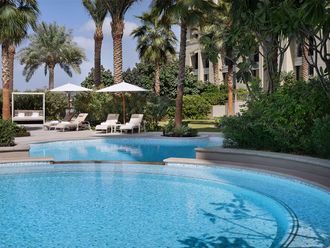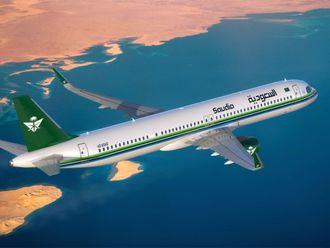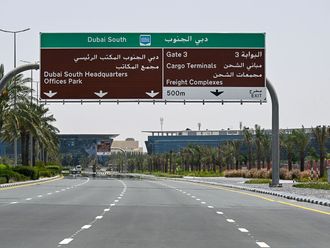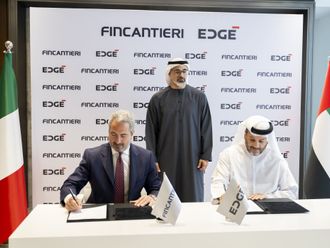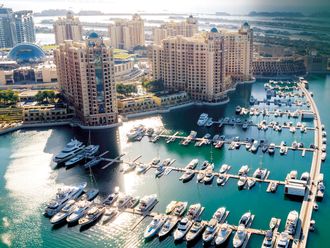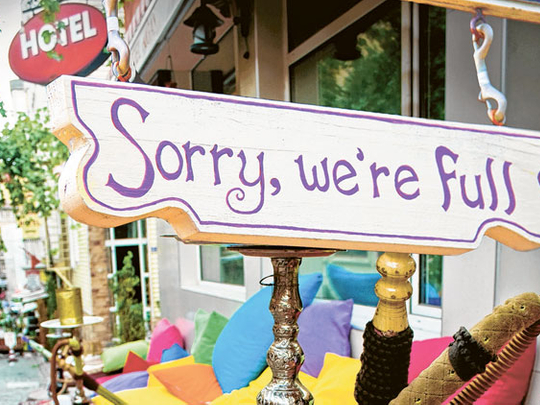
Dubai: Finding a hotel room during the Eid holidays in Dubai might be difficult this year.
Hotels are anticipating 100 per cent occupancy and many are already sold out ahead of the six-day break due to the influx of tourists from the Gulf Cooperation Council (GCC) countries and the effect of the Arab Spring, hotel managers said.
Dubai's hotels were already running at 78.6 per cent occupancy last month compared the same time last year, according to the new HotStats Mena (Middle East and North Africa) Chain Hotels Market Review by TRI Hospitality Consulting.
"Well located, well positioned properties will be running close to 100 per cent occupancy during Eid," said Peter Goddard, managing director of TRI. "The survey indicates that hotel occupancy is 80 per cent year to date, so the holiday period will be more than that."
Hoteliers say the revenue per available room (RevPar, an industry benchmark) has increased by up to 25 per cent during this busy season. Guests, however, can take comfort from the fact that room rates are about 15 per cent cheaper this year compared to previous years because the economy has yet to improve, hospitality analysts say.
Hotels such as The Meydan Hotel, Bab Al Shams Desert Resort and Spa, Samaya Hotel Deira, Ramada Downtown Dubai, Emirates Grand Hotel, Coral Hotels and Al Bustan Center and Residence have all had brisk Eid bookings and are expecting 100 per cent occupancy, their spokesmen said.
‘Very promising'
"It will be difficult to get the rooms and all the hotels will be selling on higher rates. It will be a fruitful month," said Habib Khan, General Manager of Arabian Courtyard Hotel and Spa, which is already sold out ahead of Eid.
Ramada Downtown hotel has secured 90 per cent of its Eid bookings. "November in general looks very promising and the Eid period is great for us. We will run on 95 to 100 per cent occupancy," said Wael Al Behi, Executive Assistant Manager at Ramada.
The Bustan Center and Residence has 60 per cent to 70 per cent occupancy and is expecting a 30 per cent to 40 per cent increase during Eid for a full house, said Moussa El Hayek, chief executive.
Most bookings are coming from the GCC, Russia, Greece, Iran, the Indian sub-continent and various European countries, hotel managers said.
Eid Al Adha is typically a peak time for hotels, but this year a few factors will mean a still busier time: it follows the weekend and therefore a longer break for families. It falls in November, the start of the tourism season in Dubai when the weather improves and the spillover of tourists wary of security issues in the Arab Spring countries pour into Dubai and other safe spots in the region.
"The truth is that Dubai is benefiting from the misfortunes of countries in the Arab Spring. Egypt and Bahrain were alternative destinations for inter-regional travel during Eid and school holidays in the Gulf countries, but they are closed for business. Dubai is perceived as a save haven and there's lots to do," said Guy Wilkinson, managing partner of Viability Managing Consultants, a hospitality and real estate consultancy.
Still, Arab Spring countries such as Egypt and Tunisia are attempting to attract tourists with attractive packages to compete with the higher rates elsewhere. "Lots of people travel with their families, so security concerns override that," Goddard said.
The five-star and luxury hotels are likely to claim the highest room rates and occupancy during Eid.
"That's what the market demands. Demand in Eid is mostly from GCC tourists and by nature they prefer mid- to up-market properties, not necessarily the two- or three-star properties."
Hotel apartments will also get a fair share as most tourists celebrate Eid holidays with their families, said Fouad Bizri, General Manager of Samaya Hotel Deira. Anticipating high or full occupancy, hotels are also expecting a spike of up to 25 per cent in rates, managers said.
"Our rates will witness a 20 to 25 per cent increase during Eid and high-demand periods," said Al Behi.
Likewise, Al Hayek expects average room revenue (ARR) to increase by 20 to 25 per cent this Eid. RevPar will increase by 15 per cent at the Arabian Courtyard hotel, Khan said.
Discounts
Hoteliers anticipating high or full occupancy will not discount their rates during Eid as they aim to maximise revenue, Goddard said.
Still, this year guests are paying up to 15 per cent cheaper rates compared to previous years, Wilkinson said.
Competition among new hotels opening, the economy failing to improve rapidly, world travel not growing as fast as anticipated and the Arab Spring making travellers cautious about the Middle East have affected the rates, he said.
Although hotels are anticipating high or full occupancy in Eid, nearly 70 per cent of UAE consumers plan to travel for leisure in the coming months, according to a recent survey by MasterCard. Asia-Pacific will see most of that traffic, with 63 per cent of UAE travellers aiming to travel to these markets, followed by 38 per cent to the Middle East and Africa, 16 per cent to Europe and only 1 per cent to North America. In terms of specific countries, India led the way with 25 per cent of UAE respondents aiming to go there in the coming year.
In terms of travel to the UAE, about 35 per cent of Omani travellers are likely to come here in the near future, followed by 17 per cent from Saudi Arabia, 16 per cent from Kuwait and 14 per cent from Qatar.
The survey was conducted from March 15 to April 27 among 17,620 consumers in 25 markets.




